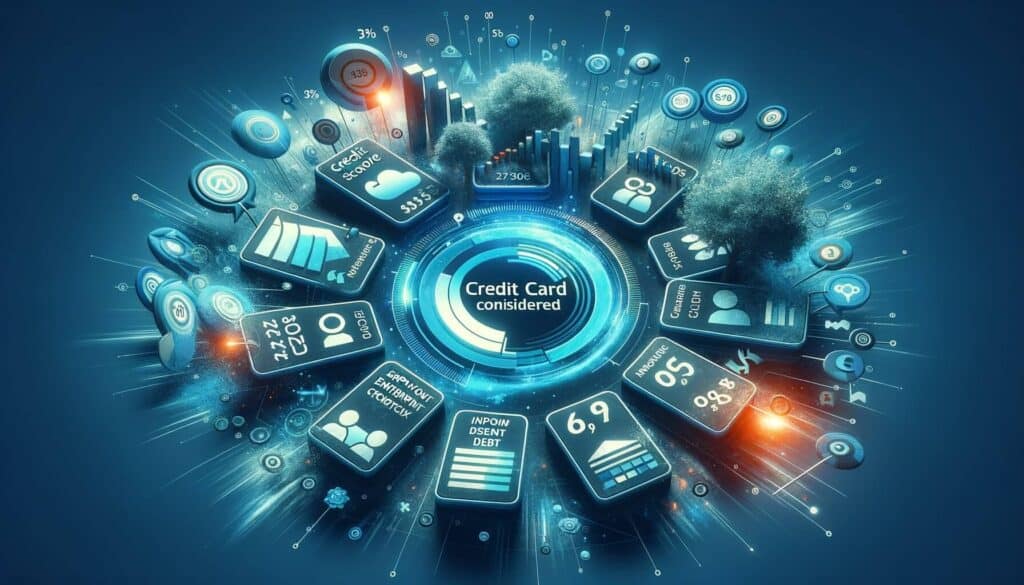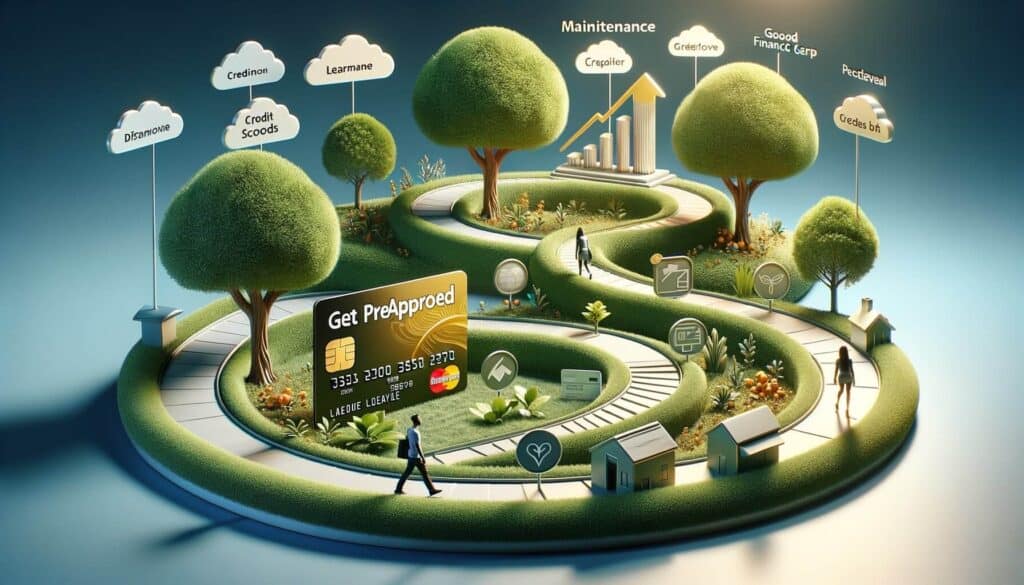
By Cindy Gardea February 14, 2025
Credit card preapproval is a process that allows individuals to determine their eligibility for a credit card before actually applying for one. It involves a preliminary evaluation of an individual’s creditworthiness by the credit card issuer, based on certain criteria such as credit score, income, and existing debt. This evaluation helps the credit card issuer determine whether the individual is likely to be approved for a credit card and what terms and conditions may apply.
Credit card preapproval offers are commonly sent to individuals through mail, email, or online advertisements. These offers typically provide information about the credit card’s features, benefits, and terms, along with an invitation to apply. However, it is important to note that preapproval does not guarantee approval for a credit card. It is merely an indication of the individual’s potential eligibility.
How Does Credit Card Preapproval Work?

Credit card preapproval works by using a soft inquiry to assess an individual’s creditworthiness. A soft inquiry, also known as a soft pull or soft credit check, does not impact the individual’s credit score. It is a preliminary evaluation that provides the credit card issuer with enough information to determine whether the individual meets their initial criteria for approval.
During the preapproval process, the credit card issuer may review the individual’s credit report, income, and other relevant financial information. They may also consider factors such as the individual’s payment history, credit utilization, and length of credit history. Based on this evaluation, the credit card issuer will determine whether to extend a preapproval offer to the individual.
If the individual accepts the preapproval offer and decides to apply for the credit card, the credit card issuer will then conduct a hard inquiry, also known as a hard pull or hard credit check. Unlike a soft inquiry, a hard inquiry can impact the individual’s credit score. It is a more thorough evaluation that occurs when the individual formally applies for the credit card.
Benefits of Credit Card Preapproval

Credit card preapproval offers several benefits for individuals who are considering applying for a credit card. Some of the key benefits include:
1. Simplified Application Process: Preapproval allows individuals to streamline the credit card application process. By knowing in advance that they are likely to be approved, individuals can save time and effort by focusing only on credit cards that match their needs and preferences.
2. Increased Approval Odds: Preapproval increases the likelihood of approval for a credit card. Since the credit card issuer has already assessed the individual’s creditworthiness, the chances of being approved are higher compared to applying without preapproval.
3. Personalized Offers: Preapproval offers are tailored to the individual’s financial profile. They provide information about credit cards that are specifically suited to the individual’s credit score, income, and spending habits. This allows individuals to choose credit cards that align with their financial goals and preferences.
4. Access to Special Promotions: Preapproval offers often include special promotions, such as introductory APRs, cashback rewards, or bonus points. These promotions can provide additional value to individuals who are considering applying for a credit card.
Factors Considered in Credit Card Preapproval

Credit card issuers consider several factors when evaluating an individual for preapproval. These factors help them assess the individual’s creditworthiness and determine the terms and conditions that may apply. Some of the key factors considered in credit card preapproval include:
1. Credit Score: Credit card issuers typically consider an individual’s credit score as a primary factor in preapproval. A higher credit score indicates a lower risk of default and may result in more favorable terms and conditions.
2. Income: The individual’s income is another important factor in credit card preapproval. It helps the credit card issuer determine the individual’s ability to repay the credit card debt. A higher income may result in a higher credit limit and more favorable terms.
3. Payment History: The individual’s payment history, including any late payments or defaults, is also considered in credit card preapproval. A history of responsible payment behavior increases the chances of preapproval and may result in more favorable terms.
4. Credit Utilization: Credit card issuers assess the individual’s credit utilization, which is the percentage of available credit that is currently being used. A lower credit utilization indicates responsible credit management and may result in more favorable terms.
5. Length of Credit History: The length of the individual’s credit history is also considered in credit card preapproval. A longer credit history provides more information about the individual’s creditworthiness and may result in more favorable terms.
How to Get Preapproved for a Credit Card

Getting preapproved for a credit card involves a few simple steps. Here is a detailed guide on how to get preapproved for a credit card:
1. Check Your Credit Score: Before seeking preapproval, it is important to check your credit score. You can obtain a free copy of your credit report from each of the three major credit bureaus – Equifax, Experian, and TransUnion – once a year. Review your credit report for any errors or discrepancies that may impact your credit score.
2. Research Credit Card Options: Research different credit card options to find ones that align with your financial goals and preferences. Consider factors such as rewards programs, interest rates, annual fees, and any special promotions.
3. Look for Preapproval Offers: Keep an eye out for preapproval offers from credit card issuers. These offers may be sent through mail, email, or online advertisements. You can also check the websites of credit card issuers to see if they have any preapproval tools available.
4. Provide Required Information: If you receive a preapproval offer, you will need to provide certain information to the credit card issuer. This may include your name, address, social security number, income, and employment details. The credit card issuer will use this information to conduct a preliminary evaluation of your creditworthiness.
5. Review Preapproval Terms: Once you receive a preapproval offer, carefully review the terms and conditions. Pay attention to factors such as interest rates, annual fees, rewards programs, and any special promotions. Make sure the credit card aligns with your financial goals and preferences.
6. Accept or Decline the Preapproval Offer: After reviewing the preapproval offer, you can choose to accept or decline it. If you accept the offer, you can proceed with the formal credit card application process. If you decline the offer, you can continue exploring other credit card options.
Understanding Credit Card Preapproval Offers
Credit card preapproval offers provide individuals with information about credit cards that they may be eligible for. These offers typically include details about the credit card’s features, benefits, terms, and conditions. Understanding preapproval offers is essential for making informed decisions about credit card applications.
Here are some key aspects to consider when understanding credit card preapproval offers:
1. Interest Rates: Preapproval offers will specify the interest rates that will apply to the credit card. These rates can vary based on factors such as the individual’s credit score and the type of credit card. It is important to compare interest rates across different preapproval offers to find the most favorable option.
2. Annual Fees: Some credit cards may have annual fees, which are charged each year for the privilege of using the card. Preapproval offers will specify the annual fees associated with the credit card. It is important to consider whether the benefits of the credit card outweigh the annual fee.
3. Rewards Programs: Many credit cards offer rewards programs, such as cashback rewards or bonus points. Preapproval offers will provide details about the rewards program associated with the credit card. It is important to consider the value of the rewards program and whether it aligns with your spending habits.
4. Introductory Promotions: Preapproval offers may include introductory promotions, such as 0% APR for a certain period or bonus rewards for spending a certain amount within a specified timeframe. These promotions can provide additional value, but it is important to understand the terms and conditions associated with them.
5. Credit Limits: Preapproval offers may provide an estimated credit limit for the credit card. This limit indicates the maximum amount of credit that will be available to the individual. It is important to consider whether the credit limit meets your financial needs and preferences.
Common Misconceptions about Credit Card Preapproval
There are several common misconceptions about credit card preapproval that can lead to confusion and misunderstanding. It is important to debunk these misconceptions to ensure individuals have accurate information when considering credit card preapproval.
1. Preapproval Guarantees Approval: One of the most common misconceptions about credit card preapproval is that it guarantees approval for a credit card. While preapproval indicates potential eligibility, it does not guarantee approval. The credit card issuer will still conduct a formal evaluation before making a final decision.
2. Preapproval Impacts Credit Score: Another misconception is that preapproval will negatively impact an individual’s credit score. In reality, preapproval involves a soft inquiry, which does not impact the credit score. It is only when the individual formally applies for the credit card that a hard inquiry is conducted, which can impact the credit score.
3. Preapproval Requires Immediate Action: Some individuals believe that preapproval offers require immediate action and that they must apply for the credit card right away. In reality, preapproval offers are valid for a certain period, typically a few weeks or months. Individuals have the flexibility to review the offer and make an informed decision within that timeframe.
4. Preapproval Means Automatic Approval: Another misconception is that preapproval means automatic approval for a credit card. While preapproval indicates potential eligibility, the credit card issuer will still evaluate the individual’s creditworthiness and may consider additional factors before making a final decision.
5. Preapproval Limits Options: Some individuals believe that accepting a preapproval offer limits their options for other credit cards. In reality, accepting a preapproval offer does not obligate the individual to apply for the credit card. It simply provides an opportunity to explore the credit card further and make an informed decision.
Frequently Asked Questions about Credit Card Preapproval
Q1. What is the difference between preapproval and prequalification for a credit card?
Preapproval and prequalification are often used interchangeably, but they have slightly different meanings. Prequalification typically involves a preliminary evaluation of an individual’s creditworthiness based on self-reported information. It is a less formal process compared to preapproval and does not involve a credit check. Preapproval, on the other hand, involves a more thorough evaluation of an individual’s creditworthiness based on a credit check.
Q2. Does preapproval guarantee approval for a credit card?
No, preapproval does not guarantee approval for a credit card. It is an indication of potential eligibility based on a preliminary evaluation. The credit card issuer will still conduct a formal evaluation before making a final decision.
Q3. Does preapproval impact my credit score?
No, preapproval does not impact your credit score. It involves a soft inquiry, which does not impact the credit score. It is only when you formally apply for the credit card that a hard inquiry is conducted, which can impact the credit score.
Q4. Can I apply for multiple credit cards after receiving preapproval offers?
Yes, you can apply for multiple credit cards after receiving preapproval offers. Accepting a preapproval offer does not obligate you to apply for the credit card. It simply provides an opportunity to explore the credit card further and make an informed decision.
Q5. How long are preapproval offers valid?
Preapproval offers are typically valid for a certain period, usually a few weeks or months. The exact validity period will be specified in the preapproval offer. It is important to review the offer and make a decision within that timeframe.
Conclusion
Credit card preapproval offers individuals a convenient way to determine their eligibility for a credit card before applying. It involves a preliminary evaluation of an individual’s creditworthiness based on factors such as credit score, income, and existing debt. Preapproval offers several benefits, including a simplified application process, increased approval odds, personalized offers, and access to special promotions.
To get preapproved for a credit card, individuals need to check their credit score, research credit card options, look for preapproval offers, provide required information, review preapproval terms, and accept or decline the preapproval offer. It is important to understand credit card preapproval offers, including factors such as interest rates, annual fees, rewards programs, introductory promotions, and credit limits.
There are several common misconceptions about credit card preapproval, including the belief that preapproval guarantees approval, impacts credit score, requires immediate action, means automatic approval, and limits options. It is important to debunk these misconceptions to ensure individuals have accurate information.
Overall, credit card preapproval can be a valuable tool for individuals who are considering applying for a credit card. It provides a way to assess eligibility, explore credit card options, and make informed decisions. By understanding the process and considering the factors involved, individuals can navigate credit card preapproval effectively and maximize their chances of approval.
